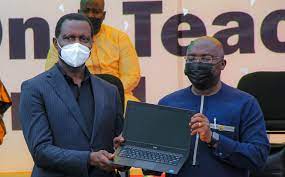In Ghana, the conversation around quality education is ever-present, and Vice President Bawumia's recent proposal to provide laptops to high school freshmen and sophomores has sparked considerable discussion.
At first glance, this initiative may seem promising, especially in the context of our digital age. Yet, skepticism lingers among many citizens, particularly as this announcement emerges close to election season.
There’s a growing sentiment that such grand promises may not align with past experiences. For instance, the "one teacher, one laptop" initiative faced significant challenges and ultimately did not meet its goals.
If the management of a smaller group proved problematic, one might wonder about the feasibility of extending similar support to a much larger student population.
This pattern of ambitious announcements often leads to disappointment. While the government seeks to capture public attention with bold initiatives, the follow-through tends to lack the necessary substance.
There are critical foundational issues in our education system—like outdated facilities, inadequate resources, and the need for better teacher training—that often go unaddressed in favor of more visible, yet superficial, projects.
The recent laptop initiative appears to be another example of this approach, drawing focus away from pressing issues within our educational framework. Questions arise about the transparency of the procurement process and the logistics involved in distribution.
Such concerns could hint at deeper systemic challenges that may undermine the effectiveness of this program.
Moreover, there’s an ongoing need for solutions that are sustainable and genuinely address the long-term needs of students and educators alike.
Quick fixes, while appealing in the short term, may not contribute to the kind of substantive improvement that Ghanaian students deserve.
As we examine the motivations behind these initiatives, it’s essential to look beyond the headlines. While the prospect of digital tools for education is exciting, the real measure of progress lies in the strategic planning and genuine investment in our schools.
Ghanaians aspire to more than just well-intentioned proposals; they seek actions that lead to meaningful change.
Ultimately, it’s crucial for our leaders to focus on building trust through consistent and effective governance.
The people of Ghana deserve a commitment to deep, lasting reforms that prioritize the needs of students over mere political gains.
It is time to elevate the conversation around education and ensure that initiatives truly reflect a dedication to progress rather than a fleeting spectacle.
Latest Stories
-
Queenmother calls on President-elect Mahama to appoint more women in his government
4 minutes -
Atletico Madrid beat Barcelona to go top of La Liga
22 minutes -
Usyk breaks Fury’s heart with points win in rematch
24 minutes -
Ghana-Russia Centre to run Russian language courses in Ghana
6 hours -
The Hidden Costs of Hunger: How food insecurity undermines mental and physical health in the U.S.
6 hours -
18plus4NDC marks 3rd anniversary with victory celebration in Accra
9 hours -
CREMA workshop highlights collaborative efforts to sustain Akata Lagoon
9 hours -
2024/25 Ghana League: Heart of Lions remain top with win over Basake Holy Stars
10 hours -
Black Queens: Nora Hauptle shares cryptic WAFCON preparation message amid future uncertainty
11 hours -
Re-declaration of parliamentary results affront to our democracy – Joyce Bawah
11 hours -
GPL 2024/25: Vision FC score late to deny Young Apostles third home win
11 hours -
Enhancing community initiatives for coastal resilience: Insights from Keta Lagoon Complex Ramsar Site Workshop
11 hours -
Family Health University College earns a Presidential Charter
11 hours -
GPL 2024/25: Bibiani GoldStars beat Nsoatreman to keep title race alive
11 hours -
GPL 2024/25 Bechem United keep title hopes alive with narrow win over FC Samartex
12 hours

